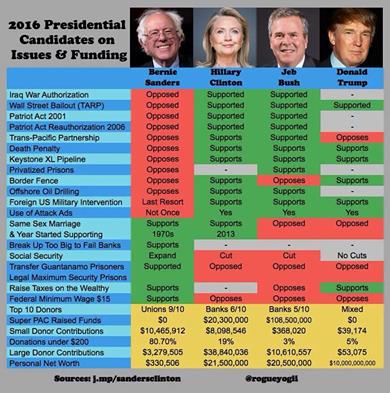The above chart illustrates an additional aspect of the US elections: there is actually not much a difference between Hillary and Donald when it comes to essential questions of politics. That's even scarier, because if I had to choose between Clinton and Trump, I would go for Trump. He is openly unsympathetic, whereas Clinton covers up her unpopular politics with her establishment background. But even though they represent two opposing parties, their politics are almost identical. Only Sanders has a distinctive political agenda ... and that's probably the reason why many of my US friends support his campaign.
The German weekly Die Zeit published in September 2013 before the federal election an essay by Wolfgang Uchiatus, which describes a similar phenomenon in German politics: democracy is failing because the political agenda of most parties converges to more of the same. The political power which a democracy bestows upon the citizen as his to transfer to his political representatives is basically gone; The concept of democracy is twisted ad absurdum, because it does not matter anymore who you give your vote: the political caste is mentally incestuous and probably also to some extent physically. Uchiatus argues that the citizen can only resort to one last power: turning into a conscious consumer. What matters is how we spend our money. That's why the essay is titled: Should I vote or shop?
After 15 years in China, its quite compelling to witness how freedom of choice in Western democracies and Eastern technocracies meets at similar levels. I feel nevertheless that Chinese have got the better deal: they are not allowed to even think about politics, but they - at the time being - have no moral constraints to consume. Consumption is therefore a free choice to compensate for a lack of political freedom. Europeans and Americans are allowed to think about politics, but their frustration about making no difference, will eventually push them into the same compensation behavior as the Chinese; with the downer that you can't go loose, but have to make good consumer choices.

 RSS Feed
RSS Feed